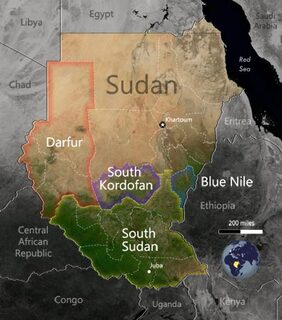 To view the PDF of this Article CLICK HERE To listen to a Podcast related to this article Click Here Power Sharing Agreement Signed by Military Council and Civilian Opposition Alliance On 17 August, it was reported that General Mohamed Hamdan “Hemeti” Dagolo and Lt. General Abdal Fattah Abdelrahman Burhan for the Military Council and Ahmed Al-Rabie for the Alliance for Freedom and Change signed an agreement to usher in a new governing council to include both civilians and military generals to pave the way towards elections and civilian rule within 3 years. War Criminal Pledges to Honour Agreement General Hemeti Dagolo, considered the dominant figure in the Military Council, pledged in an interview to the BBC: “We will stick to every single letter we have agreed on. Even without the agreement, we have to work in this direction because it is in the country’s interest. Therefore we have to carry out the agreement, stick to it and support it.” Hemeti is the Commander of the Rapid Support Forces (RSF) which grew out of the notorious Janjaweed militia, which was accused of carrying out genocide in the Darfur region of Western Sudan. 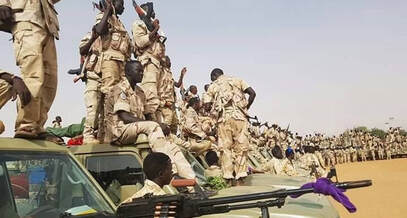 Tarnishing the Reputation of Murderers The RSF have been blamed for the violent repression of protests, including the 3 June 2019 massacre, which reportedly killed more than 120 people, many of whom were dumped in the Nile River. In the BBC interview, Hemeti described that there had been “a systematic plotting and conspiracy” to “tarnish the reputation” of the RSF, which he described as “protectors - not killers”. Revolutions, Coup d’Etats and War Sudan has been afflicted by a series of 7 revolutions and coup d'états and a series of wars since the British handed over their protectorate, 1 January 1956 and granted its independence. Uprising Paralyses Khartoum The present crisis can be traced back to December 2018, when Dictator Omar Al Bashir’s regime imposed emergency austerity measures cutting bread and fuel subsidies. This sparked demonstrations which brought the capital city of Khartoum to a standstill. 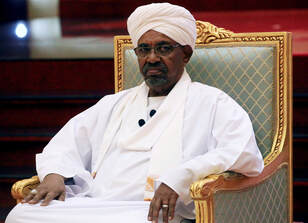 War Crimes and Genocide Omar Al Bashir came to power in 1989 as a brigadier in the Sudanese Army when he led a military coup that ousted the government of prime minister Sadiq Al-Mahdi. In March 2009, Al Bashir was indicted by the International Criminal Court (ICC) for war crimes including “mass killing, rape and pillage” against civilians in Darfur. The prosecutor of the International Criminal Court accused Al Bashir of “genocide, crimes against humanity and war crimes”. On 12 July 2010, the court issued a second warrant containing 3 separate accounts of genocide. Ignoring Genocide and War Crimes – Focusing on Corruption Although the Military Council reports that they have removed Omar Al Bashir from office because of allegations of corruption, there is no talk of handing him over to the ICC to face trial for genocide and war crimes. Despite his pledge to end the decades long civil war that had been afflicting the country when he took power in 1989, Bashir prolonged and intensified the war. The ICC Chief Prosecutor, Louis Marena–Ocampo, reported that US$9 Billion of ill-gotten gains had been “stashed in London banks” by Al Bashir. As there is no talk of handing Al Bashir over to the ICC, nor of indicting him for the genocide perpetrated against Christians in South Sudan and the Nuba Mountains, many question whether Al Bashir has genuinely been ousted from power, or whether he is being protected by the Transitional Military Council. Overthrow of Bashir In April, after unprecedented large demonstrations, the dictator Omar Al Bashir, who had been ruling for 30 years, was reportedly overthrown by the military. The council of generals led by Lt. Gen. Abdel Fattah Abdel Rahman Burhan assumed power. Forces of Freedom and Change However the demonstrators stayed put outside the military headquarters, insisting that it transfer authority to a civilian administration. Various protest groups came together under the umbrella Forces of Freedom and Change. Tens-of-thousands of protestors took to the streets to force the Junta to have talks on a power sharing arrangement. 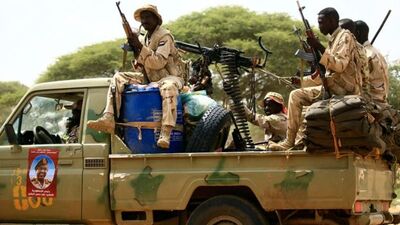 Who and What are the Rapid Support Forces? The Rapid Support Forces (RSF) have been identified as the real ruling power in Sudan. They represent a new kind of regime – a hybrid of ethnic militia and criminal business enterprise, a transnational mercenary force that has captured a state. The RSF was formally established by decree by Omar Al Bashir in 2013. Although their core of 5,000 militiamen had been armed and active long before that time. Dictator Al Bashir mobilised the Janjaweed to fight against Black African Muslim insurgents in Darfur in 2003. The Janjaweed were soon formalised by Al Bashir into a paramilitary force called the Border Intelligence Units. The brigade active in South Darfur was under Mohamed Dagolo, known as Hemeti, because of his baby-faced looks – Hemeti, being a mother’s endearing term for little Mohamed. This force mutinied when the government failed to pay them. Hemeti recruited volunteers from Darfur’s Black African Fur ethnic group into his army to fight alongside his Arabs, their former enemies. Although Hemeti’s commanders are all from his Mahariya Arabic clan, he has been quick to enlist men from all ethnic groups, even absorbing a breakaway Darfur faction of the rebel Sudan Liberation Army (SLA). The RSFs strength has grown in recent years tenfold, but its command structure has remained Darfuran Arabs. All of its generals share the Dagolo name. With reportedly 70,000 men and more than 10,000 armed land cruisers, pickup trucks, the RSF is Sudan’s De facte military, capable of controlling the streets, borders and the capital. Transnational Mercenary Proxy Force Hemeti negotiated a deal with Al Bashir’s government whereby he became a Brigadier General and received massive cash payment in exchange for placing his troops under the command of the National Intelligence and Security Service (NISS) who had at that time were organising a proxy war with Chad. Some of Hemeti’s fighters then served under the banner of the Chad opposition even taking its capital N’Djamena in 2008. 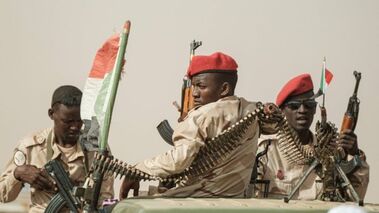 Mutinous Mercenaries Became Bashir’s Private Army While the army Chief of Staff did not like this hiring of a mutinous mercenary, preferring the money to go to strengthen their regular forces, Omar Al Bashir found the RSF useful, purchased their loyalty and made them answerable to Bashir himself, who gave Hemeti the nickname Himayti – meaning “my protector.” Effective Jihadists in Darfur – Defeated in the Nuba Mountains Hundreds of land cruiser pickup trucks were imported and fitted out with machine guns for Hemeti’s RSF. While the RSF did well against the Black Muslim rebels in Darfur, they were decisively defeated by the Christian Nuba in South Kordofan. Gold Rush in Darfur When gold was discovered in Jabul Amir in North Darfur in 2012, just as Sudan was facing economic crisis, the gold seemed like a blessing, but it quickly developed into a curse. Tens-of-thousands of Arabs flocked to the remote corner of Darfur in a gold rush where many were crushed in collapsing shafts, or poisoned by the mercury and arsenic used to process the gold nuggets. Some gold was sold to the government which paid above market prices, as it was so desperate to get its hands on gold, which it could sell in Dubai for hard currency.  Smuggling and Slavery However, other gold was smuggled across the border to Chad, where it was profitably exchanged in a racket involving buying stolen vehicles and smuggling them back into Sudan. In Chad, a 1.5kg bar of gold could be bartered for land cruisers, which were probably stolen from aid agencies and then driven back to Darfur, to be fitted out. The RSF are policing Sudan’s borders, extracting bribes, levies and ransoms and engaging in human trafficking/slavery. Mercenaries for Hire Dubai is the destination for most of Sudan’s gold, official or smuggled. Hemeti’s contacts with the United Arab Emirates (UAE) are extensive. Under a 2015 agreement, the Sudanese government sends units of its army to serve with the Saudi Arabian/Emirate Coalition Forces in Yemen. The UAE has struck a parallel deal with Hemeti to send a much larger force of RSF fighters to combat in South Yemen. Hemeti also provides units to guard the Saudi Arabian border with Yemen. Sudan has 16,000 troops securing the Saudi Arabian – Yemen border. Political, Military and Economic Power Broker Therefore, using gold and mercenary activity, Hemeti controls Sudan’s largest political budget without the need to give any account. The Al-Junaid company run by his relatives have become a vast conglomerate covering investment, mining, transport, car rental and iron and steel amongst others. Hemeti is now one of the richest men in Sudan with more ready cash than any other politician. He is at the centre of a web of patronage, secret security deals and political pay-offs. Every week, Hemeti is in the news, handing out cash to police, electric workers, teachers and gifting cars to tribal chiefs. 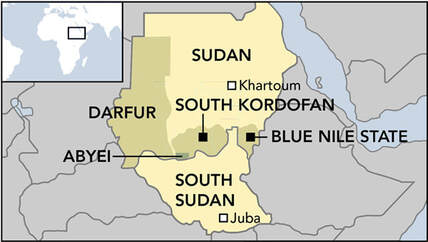 Darfur, Libya, Blue Nile and the Nuba Mountains As the UN-African Union Peace Keeping Force were going to downscale in Darfur, the RSF just took over their camps. Hemeti also dispatched a brigade to Libya to fight alongside the rogue general Khalifa Haftar. Human Rights Watch accuses Hemeti Dagolo of responsibility for torture, extra judicial killings and mass rapes by his forces in Darfur, Southern Blue Nile and South Kordofan/the Nuba Mountains. Criminal Entrepreneur Hires Canadian Public Relations Firm to Improve His Image Like the mercenary free booters of the 19th century, who publically swore allegiance to the Kedive of Egypt, but set up and ruled their own private empires, Hemeti is a military – political entrepreneur, whose paramilitary criminal business empire transcends boundaries. He has been described as the most powerful individual in Sudan today. To improve his image internationally, Hemeti has enlisted the services of a Canadian public relations firm. Regional Power Play Pits Two Forms of Totalitarianism Against One Another While Saudi Arabia and United Arab Emirates are supporting Sudan’s military, Turkey and Qatar are more closely aligned with the Sudanese Islamists. So it would appear that what is going on in Sudan is not some kind of popular uprising of civilians, as much as a regional power play backing two versions of totalitarianism. Neither side would appear to be at all interested in freedom and justice. International Intrigues Opposition leaders in Sudan warn that their military rulers are being exploited by foreign powers, eager to take advantage of the country’s natural resources and strategic location. The United Arab Emirates is Sudan’s main destination for exports, buying most of the country’s gold. China imports significant amounts of Sudan’s oil. Saudi Arabia buys most of Sudan’s livestock. Turkey and Qatar have signed a deal last year for US$4 Billion to support Sudan in developing of the Port of Suakin, South of Port Sudan. This highly strategic move could allow Turkey to establish a military presence on the Red Sea. Saudi Arabia and UAE are trying to put pressure on Sudan to cancel the deal. Since 2015, Sudan’s foreign policy has shifted away from its previous close ties with Iran towards Saudi Arabia and its allies.  Understand the Historic Context of the Current Crisis To understand Sudan’s history, read Faith Under Fire in Sudan and obtain the Sudan: The Hidden Holocaust and Terrorism and Persecution – Understanding Islamic Jihad films from Christian Liberty Books, PO Box 358, Howard Place 7450, Cape Town, South Africa, Tel: 021-689-7478, Fax: 086-551-7490, Email: [email protected] and Website: www.christianlibertybooks.co.za. Dr. Peter Hammond Frontline Fellowship P.O. Box 74 Newlands 7725 Cape Town South Africa Tel: 021-689-4480 Email: [email protected] Website: www.FrontlineMissionSA.org  To listen to our latest interview on Understanding the Crisis in Sudan on From the Frontline, click here. See also: Sudan in the Scriptures Bibles for the Nuba Mountains Mission to Sudan’s Nuba Mountains Mission to Nuba Mountains in Sudan Under Fire in the Nuba Mountains Genocide in the Nuba Mountains of Sudan
0 Comments
Leave a Reply. |
More Articles
All
Archives
February 2021
|
"And Jesus came and spoke to them, saying, “All authority has been given to Me in heaven and on earth.
Go therefore and make disciples of all the nations, baptizing them in the name of the Father and of the Son and of the Holy Spirit,
teaching them to observe all things that I have commanded you; and lo, I am with you always, even to the end of the age.” Amen.” Matthew 28: 18-20
Go therefore and make disciples of all the nations, baptizing them in the name of the Father and of the Son and of the Holy Spirit,
teaching them to observe all things that I have commanded you; and lo, I am with you always, even to the end of the age.” Amen.” Matthew 28: 18-20
|
P.O.Box 74 Newlands 7725
Cape Town South Africa |
|

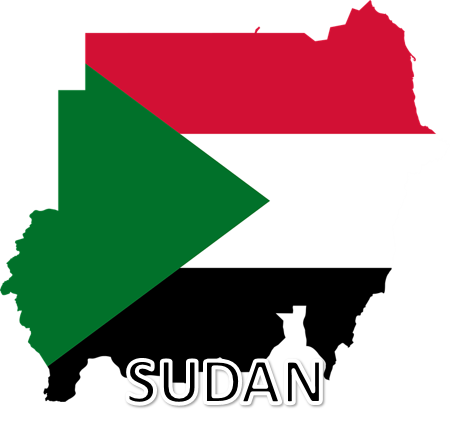
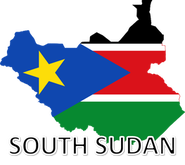

 RSS Feed
RSS Feed
